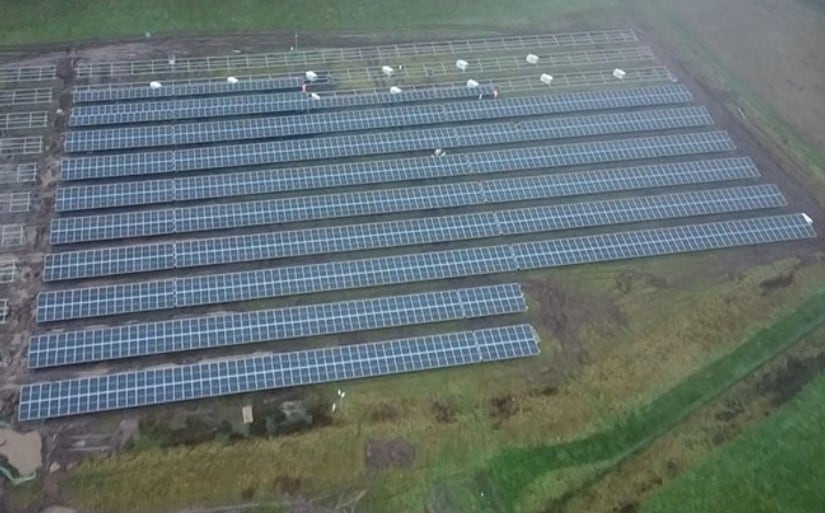The food & beverage industry is a major contributor to greenhouse gas emissions and it is vital for businesses to start reducing their carbon footprint, with various strategies at their disposal to do so, says Chris Calder, B2B solutions client director at E.ON
The food & beverage industry is a critical part of our daily lives, providing sustenance and nutrition to billions of people globally. However, it also carries a substantial environmental footprint, particularly from the use of fossil fuels in heat generation and processing, contributing significantly to carbon emissions. With the growing population and consumption trends, it is imperative for food & beverage businesses to start their decarbonisation journey today, giving specific focus to heat decarbonisation and the removal of fossil fuels from their processes.
Decarbonising the food & beverage industry
The food & beverage industry is diverse, encompassing everything from agriculture and food processing to transportation and distribution. At each stage of this complex supply chain, energy is required, and traditionally involves an energy-intensive manufacturing process, with a substantial portion of this energy coming from fossil fuels, primarily natural gas. This reliance on fossil fuels has made the food & beverage industry a significant contributor to greenhouse gas emissions, responsible for 165 million tonnes of carbon emissions in 2019 and accounting for around 21% of the UK’s total carbon footprint¹.
To meet the climate goals of the Paris Agreement to lower carbon emissions by 45% by 2030 and to reach net zero by 2050, among the changing attitudes to reduce global warming and follow sustainable practices, major changes are required. The food & beverage industry is already making strides into carbon reduction, but some are still at the start of their decarbonisation journey. Below are several key strategies to tackle this challenge.
Energy efficiency: analyse and optimise your energy management

The starting point to any net zero road map is to understand your current energy position, analysing data to reveal your energy usage, consumption and costs. Business energy management systems (BEMS) are effective energy modelling solutions to help identify and drive energy, cost and carbon savings. There are also a wider number of other energy monitoring solutions on the market, but users should take care to select one that is correctly integrated into their energy systems and production processes to ensure its capability is applied in the most effective manner. Practical energy efficiency measures that can be implemented in a food & drink manufacturing setting can cover everything from lighting and refrigeration, as well as heating, ventilation and air conditioning (HVAC) systems. Visualising energy consumption through E.ON’s Optimum platform is a great starting point in understanding energy usage on-site.
Heat decarbonisation: transitioning to renewable energy sources
One of the most impactful steps in decarbonising a food & beverage manufacturing site is transitioning to renewable energy sources for heat generation. Heat is an essential component of food processing, used for cooking, pasteurisation, sterilisation and numerous other applications. Traditionally, this heat is produced using natural gas, which emits CO₂ when burned.
To reduce emissions associated with heat generation, manufacturers can turn to renewable energy sources such as solar, wind or geothermal power (heat pumps). Solar PV systems harness the power of the sun, wind turbines harness the power of wind, and heat pumps use the earth’s geothermal power. Heat pumps can draw on multiple inputs from air, ground and water depending on the manufacturing process and suitability of site conditions and requirements. These can all be used to produce heat for steam and hot water for food & beverage manufacturing. Integrating energy-efficient technologies and practices can further enhance the sustainability of heat generation in food & beverage production.
Electrification of heat processes

Another promising avenue for food & beverage industry decarbonisation lies in the electrification of heat processes. By replacing gas-fired boilers and furnaces with electric heating systems powered by renewable energy sources, companies can significantly reduce their carbon emissions. Electrification also offers greater control and efficiency in heat production, making it a solid option for various food & drink processing applications. Heat pumps have made significant advancements over the last decade, meaning they can be a viable alternative to fossil fuel-driven heat sources, which typically run at very high temperatures but are less efficient.
In addition to reducing carbon emissions, electrification of heat processes can contribute to improved air quality and reduced environmental pollution in urban areas where many food & beverage processing facilities are located. This transition requires investment in electric infrastructure and the development of energy-efficient electric heating technologies, but the long-term benefits for the environment and public health are substantial.
Removing gas from food & drink processing
Another critical aspect of reducing the carbon footprint for food & beverage manufacturers involves removing gas from various processing steps. Gas-based technologies, such as gas ovens and gas-fired drying processes, are widely used in food production. Transitioning to electric alternatives or redesigning processes to be gas-free can be challenging, but is essential to achieve sustainability objectives.
For example, electric induction cookers and ovens can replace traditional gas stoves in commercial kitchens, reducing emissions and improving cooking precision. Similarly, electric heat pumps can be employed for efficient heating and cooling in food & drink storage facilities, reducing the reliance on gas-based HVAC systems. Identifying opportunities that allow the reuse of waste heat is also critical in the reduction or removal of gas from processing, along with potential temperature reductions, which all feed into better energy efficiency.
Helping a global manufacturer reduce CO₂

E.ON recently installed a major solar farm for one of the world’s largest producers of spirits and beers – the biggest of its type in Scotland. More than 7,700 solar panels were installed near their site, capable of reducing carbon dioxide emissions by a whopping 830 tonnes a year.
Innovations in food packaging
Decarbonising food & beverage manufacturing sites isn't limited to production processes alone. Packaging plays a vital role in preserving food and drinks, but it also contributes to carbon emissions, particularly when derived from fossil fuels or requiring a sterilisation process, which needs high-grade heat. Packaging can also use significant amounts of CO₂ which, in the past, has led to supply shortages. Businesses may be in a position to capture excess carbon to then reuse in their process. Carbon capture and reuse could be a viable option for manufacturers where the supply of CO₂ is critical to business processes.
Supply chain optimisation
To achieve net zero carbon, manufacturers should also be looking at their supply chain as science-based targets suggest this will contribute to their carbon position under Scope 3. Reducing food & beverage waste, optimising transportation routes, and adopting greener logistical practices can all help minimise emissions associated with operations. Scope 3 is one of the most challenging aspects of addressing overall emissions; however, looking at all areas of the supply chain and the impacts will be critical in a joined-up approach to achieving net zero goals.
Key challenges in decarbonising the industry

Installing new technology and operational processes to manufacturing sites can be a very costly and disruptive process. The cost-challenge is not specific to this industry, but all sectors wanting to decarbonise. E.ON has the size and expertise to offer funding models to customers, including no upfront CAPEX costs.
It is vital for many manufacturers to keep processing operations going 24/7, while not sacrificing quality and safety standards. Disruption or interruption of these processes can have significant cost and delivery implications.
For manufacturers that make food and drinks, these processes can involve sterilisation, pasteurisation, chlorination or cooking with steam, which all need high-grade heat and temperatures. Renewable technologies that reach these temperatures can be costly or may require integrated solutions.
Space and available on-site land is also a strong consideration, as it typically comes at a premium and is reserved for core processes, new product lines or production capacity expansion. Those adopting new renewable technologies will need to consider long-term production planning and allocate adequate space and resources to support this, while achieving the business’s product and production targets.
Hydrogen as an alternative
Hydrogen is emerging as a potential alternative to natural gas. E.ON is currently researching this technology with manufacturers, as we see this as a fundamental component of the future energy system. Green hydrogen is produced using renewable energy through a process called electrolysis, offering a carbon-neutral source of heat. By using green hydrogen in place of natural gas, food and beverage processing facilities can reduce their greenhouse gas emissions significantly.
However, the adoption of hydrogen faces challenges, including the need for infrastructure development, cost considerations, and ensuring a stable and clean hydrogen supply. As technology advances and production costs decrease, hydrogen could become a more prevalent and sustainable heat source for the industry. There may be a greater use for hydrogen in manufacturing and energy-intensive processing, as well as fleet and long-haul transport. Policy support from government is a key component of hydrogen adoption and must play a role in the future.
Government policy and industry collaboration
To facilitate the transition towards decarbonisation, the government needs to implement policies that incentivise renewable energy adoption and carbon reduction strategies within the food & beverage industry. Additionally, collaboration between industry stakeholders, including manufacturers, processors, and retailers, can foster knowledge-sharing and drive innovations that enable sustainable practices.
Decarbonising the food and beverage industry is a multi-faceted challenge that requires concerted efforts at every level of the supply chain. Heat decarbonisation, along with the removal of gas from processing operations, is pivotal in reducing the industry's carbon footprint. By embracing renewable energy sources, electrification, hydrogen and innovative technologies, the food & beverage industry can play a vital role in mitigating climate change, while ensuring a sustainable and resilient supply of food and drink for the future.
Find out more at www.eonenergy.com/food-and-beverage


